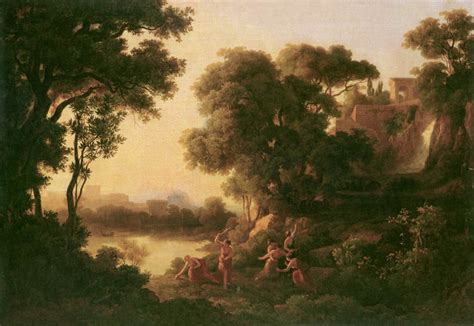Description
In 1847, the famous Hungarian painter Károly Markó the Elder (Károly Markó The Elder) gave us a masterpiece entitled "The death of Eurídice" (The Death of Eurydike). This piece, which sinks its roots in the mythical story of the tragic loss of Eurídice and the deconsole of Orpheus, stands out for its lyric perfection and its technical subtlety.
When observing the painting, it is impossible not to feel an immediate attraction towards the careful scenic composition. The work is dominated by a tragic atmosphere, with an aggregate landscape that encloses the characters in a bleak environment and loaded with symbolism. In the center of the composition, Eurídice lies in a posture that denotes both fragility and resignation, while vital signs leave their body. The figure is ethereal, with a pale skin that contrasts wonderfully with the deep and brown green of the landscape and vaporous fabric clothes with which it is wrapped.
Markó the old man, highlighted by his mastery in the representation of romantic landscapes, does not spare here the use of techniques that masterfully combine the real with the idealized. The treatment of light in the work is significant, with subtle rays that are filtered through the leaf canopy and caress the Euridice figure, almost as if the sun itself regrets its destination.
As for the color, Károly Markó the old man uses a sober palette but rich in nuances. Earth tones in the landscape and the use of green and ocher provide a solid and natural base, while the darkest and cold touches around the characters accentuate the feeling of loss. The clarity in the skin of Eurídice and the delicate shadows that surround it add an almost sculptural quality to its figure.
It is also crucial to mention that, although Orpheus is not explicitly present in this specific work, its absence adds an interpretive layer. His physical absence does not minimize the omnipresence of his pain, palpable in the melancholic atmosphere that Markó manages to capture.
The landscape is not simply a background for tragedy, but an integral actor in the narrative. Challengingly erect trees, leaves that seem to stop momentarily in its fall, and a murky sky that seems to whisper the imminence of fatality, all these elements contribute to the dreary air of the scene. Károly Markó the old man, recognized for his ability to instill life and emotion in landscapes, here transcends his own conventions, using each brushstroke not only to paint, but to cry the death of Eurídice.
Markó is historically distinguished by his ability to imbue natural representations with an obvious narrative sensitivity. This painting In particular it reflects its domain of both the romantic landscape and of the classical tragedy, managing to merge both aspects in a work that excites and causes a deep reflection on the inevitability of destiny and the fragility of human life.
When analyzing the legacy of Károly Markó the old man, "the death of Eurídice" remains a clear example of his artistic genius. Your attention to detail, your ability to capture complex human emotions and your skill in the use of color and composition are beautifully represented in this painting. The technical and emotional features of the work make it not only a tribute to the myth, but also a testament of Markó's singular ability to intertwine nature and human narrative in a single canvas.
KUADROS ©, a famous paint on your wall.
Hand-made oil painting reproductions, with the quality of professional artists and the distinctive seal of KUADROS ©.
Art reproduction service with satisfaction guarantee. If you are not completely satisfied with the replica of your painting, we refund your money 100%.

